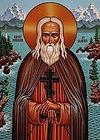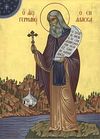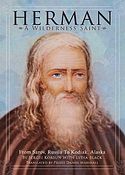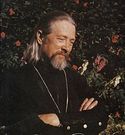

| Previous day | Next day |
| Old Style
December 12
|
Sunday |
New Style
December 25
|
|
27th Sunday after Pentecost.
Tone 2.
Рождественский пост. |
Fish, wine and oil allowed.
|
![]() St. Spyridon the Wonderworker, of Tremithus (348).
St. Spyridon the Wonderworker, of Tremithus (348).
Hieromartyr Alexander, bishop of Jerusalem (250-251). Martyr Synesius of Rome (270-275). St. Therapontus, monk of Monza Monastery (Galich) (1597).
St. Herman, Wonderworker of Alaska (1836). St. Finian of Clonard and Skellig Michael, teacher of Ireland (549). St. Colman of Glendalough (Ireland) (659). Monk-martyr John, abbot, of Zedazeni Monastery, Georgia (9th c.). St. John, metropolitan of Zichon, founder of the Monastery of the Forerunner on Mt. Menikion (1333). Synaxis of the First Martyrs of the American land: Hieromartyr Juvenaly (1796), Peter (Cungagnaq) the Aleut (1815), and Hieromartyrs Seraphim (Samoilovich), archbishop of Uglich (1937), John (Kochurov), priest, of Chicago (1917), and Alexander (Khotovitsky), priest, of New York (1937).
Repose of Flegont (Ostrovsky), stylite, of Kimlyai (Mordovia) (1870).
Thoughts for Each Day of the Year
According to the Daily Church Readings from the Word of God
By St. Theophan the Recluse

Thirtieth Sunday after Pentacost. [Col. 3:12-16; Luke 18:18-27]
The Holy Forefathers—these are truly great people! If one were to generalize the thought which defines their greatness, only those who fulfill God’s will for the human race—a positive will—are truly great, for there is much that happens only by God’s allowance. There are also powerful figures who act apart from God’s will and even against it. These too can seem great, but not in and of themselves—only according to those great counteractions which God’s Providence puts forth to efface the evil caused by them. We know God’s direct will concerning eternal salvation; but God’s plans concerning the temporal sojourn of people on the earth are hidden from us. That is why it is difficult for us to determine who acts more straightly, or more precisely according to God’s will. One can only acknowledge one negative criteria as true: He who acts against God’s determination for the eternal salvation of people cannot be considered great, no matter how ostentatious his deeds; for it is evident that he is going against the obvious will of God. Though this known will does not concern temporal, but rather eternal things, it is doubtless that the one will of God cannot contradict another.
Twenty Eighth Sunday after Pentacost. [Col. 1:12-18; Luke 14:16-24]
Many are called, but few are chosen (Matt. 22:14). All Christians are called; chosen are those Christians who believe and live in a Christian manner. In the first Christian times preaching called to faith; we are called by our birth from Christians and upbringing among Christians. And glory be to God! We pass half the road, that is, entrance into Christianity and the taking root of its principles in our heart from our very childhood, without any labour. It would seem that our faith should be all the stronger, and our life all the more correct throughout all the time that follows. It was this way; but from a certain point in time it has started to be different. Unchristian principles are permitted in our schools which ruin young people, and unchristian customs have entered into society, which corrupt them after leaving school. If according to the word of God there always have been only a few chosen, it is no surprise that in our time there are even fewer of them; such is the spirit of the age—antichristian! What will be next? If our manner of education and social customs are not changed, true Christianity will weaken more and more, and at last will entirely end; only the name of Christian will remain, but the spirit of Christianity will not be there. The spirit of the world will fill everything. What is one to do? Pray…
Articles
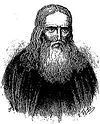 Canon to St. Herman of AlaskaFrom the Service to our Holy and God-Bearing Father, Saint Herman, Wonderworker of Alaska. |
 The Relics of St. Herman of AlaskaThe story of Saint Herman of Alaska. 2007. |







